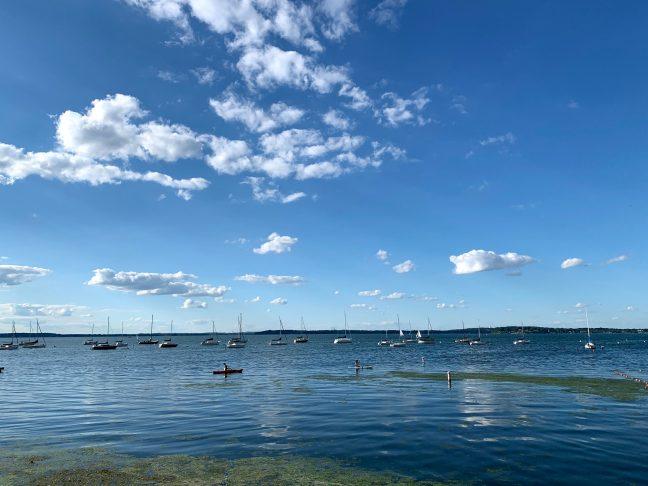Editor’s note: The Lab Report is a weekly series in The Badger Herald’s print edition where we take a deep dive into the (research) lives of students and professors outside the classroom.
Invisible to the human eye, microbes are tiny organisms that live all around us. They affect many biological processes in both our bodies and the environment we live in.
The Anantharaman Microbiome Lab at the University of Wisconsin researches microbial ecology to better understand how important biological processes are shaped by those minuscule microbes close to home in Lake Mendota.
The Anantharaman Lab studies microbial ecology from a variety of angles, including viruses, hydrothermal vents, humans and local lakes. Graduate student Patricia Tran and undergraduate student Samantha Bachand have been working together at the lab since 2019.
They focus on aquatic microbial ecology and how microbes contribute to biogeochemical cycles in Lake Mendota. Tran said what the lab studies is crucial for reasons that often go overlooked.
“It is important that people understand microbial ecology is not just bacteria, but bacteria and viruses that are all interacting with each other and having important functions across a range of study systems,” Tran said.
The duo uses a combination of field, lab and computational methods to learn how bacteria affect the sulfur cycle in the ecosystem.
The sulfur cycle tracks the movement of sulfur, a vital element to many biochemical processes, throughout an ecosystem in a variety of forms, providing insights on maintaining the health of an ecosystem. Many aspects of sulfur cycles in lakes are unknown, but microbes contribute to it by metabolizing certain compounds.
Bachand and Tran focus on characterizing and understanding the bacteria that produce hydrogen sulfide in freshwater lakes, which is important to understand since hydrogen sulfide is a toxic gas in high concentrations. They are particularly interested in studying bacteria that produce populations with minimal genetic mixing due to isolation provided the presence of oxygen — an uncommon phenomenon.
The goal of this research is to better understand lake and biogeochemical systems, but it also could lead to solutions regarding negative human impacts on lake ecosystems, Bachand said.
“We as humans have done a lot to hurt the lake ecosystems, so learning more about lake systems and what microbes do can help understand the systems and lead to possible solutions,” Bachand said.
Beyond the science, Bachand and Tran have been able to form a unique connection with their work and each other.
Before the summer after her freshman year, now-senior Bachand looked at many different labs. The Anantharaman Lab was suggested to her by a friend. After interviewing at the lab, Bachand decided to join because of the friendly environment and the experience the research offered.
Bachand began research in the Anantharaman Microbiome Lab that summer, which helped her learn the necessary balance between research and classes before her sophomore year began. Along with the work environment, Bachand also enjoyed the opportunity to work on important projects as an undergraduate.
Now, as a senior, Bachand said she has gained valuable experience and knowledge related to her research. Throughout her time at the lab, she learned the basics of microbial ecology and proper lab techniques. She applied these techniques to real-world studies on Lake Mendota, which she especially enjoyed because of its hands-on nature.
Tran has mentored students like Bachand throughout most of her graduate school experience at UW. She enjoys the opportunity to help mentees with different interests and goals because she loves the unique opportunity to be a part of an undergraduate’s academic progression.
“It is good for me too because I get to be part of their academic journey and to make their undergrad experience something more than just going to lectures,” Tran said.
Tran said it has been fulfilling to see Bachand grow as a scientist during her undergraduate education.
Bachand recently attended a biogeochemical conference where she spoke to other researchers who were interested in similar topics and learned about future research possibilities. She is also in the process of co-authoring a paper with Tran that reflects on their work from the past year and a half.
“It’s a really amazing experience to see the final product of what I have been working on,” Bachand said.
Opportunities in research for undergraduate students like Bachand prepare them for future discoveries and careers in science.
Both Bachand and Tran agreed undergraduate research is an important opportunity for people who want to get involved in science or explore possible career paths.


